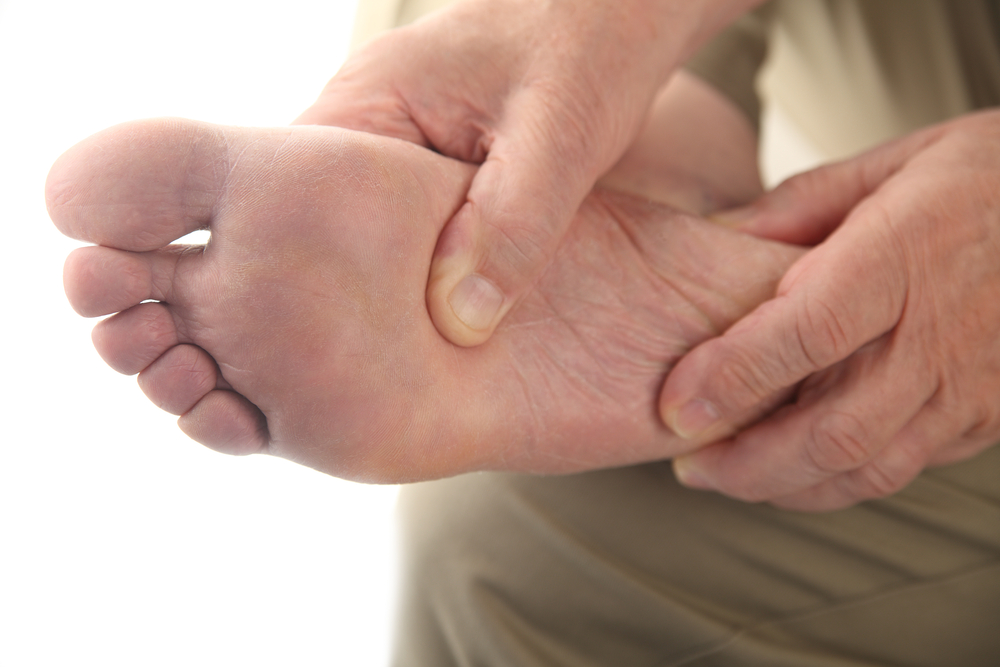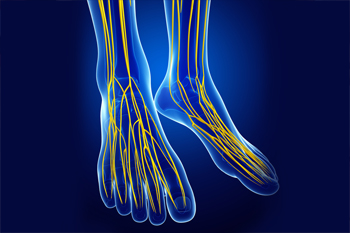Foot and Ankle Specialist
September 2021
Intervention Can Help Improve Foot Health in Aging Adults
 Foot pain does not necessarily have to be something older adults simply learn to live with. Many conditions can be treated successfully or managed to provide relief, and help the aging adult remain as active and independent as possible. Common foot disorders in older adults include corns and calluses, fungal nail infections and ingrown toenails, bunions, hammertoes and clawtoes, and complications due to systemic conditions such as rheumatoid arthritis, gout, and diabetes. A simple approach to overall foot health includes routine foot hygiene, help with trimming toenails (which can be very challenging for older adults), evaluating and modifying footwear to ensure proper fit, comfort, and support, and the use of orthotics to correct and manage various foot disorders. Additionally, regular podiatric care can improve and maintain the level of overall foot health in senior citizens.
Foot pain does not necessarily have to be something older adults simply learn to live with. Many conditions can be treated successfully or managed to provide relief, and help the aging adult remain as active and independent as possible. Common foot disorders in older adults include corns and calluses, fungal nail infections and ingrown toenails, bunions, hammertoes and clawtoes, and complications due to systemic conditions such as rheumatoid arthritis, gout, and diabetes. A simple approach to overall foot health includes routine foot hygiene, help with trimming toenails (which can be very challenging for older adults), evaluating and modifying footwear to ensure proper fit, comfort, and support, and the use of orthotics to correct and manage various foot disorders. Additionally, regular podiatric care can improve and maintain the level of overall foot health in senior citizens.
Proper foot care is something many older adults forget to consider. If you have any concerns about your feet and ankles, contact Don A. Shumway, DPM from Arizona. Our doctor can provide the care you need to keep you pain-free and on your feet.
The Elderly and Their Feet
As we age we start to notice many changes in our body, but the elder population may not notice them right away. Medical conditions may prevent the elderly to take notice of their foot health right away. Poor vision is a lead contributor to not taking action for the elderly.
Common Conditions
- Neuropathy – can reduce feeling in the feet and can hide many life-threatening medical conditions.
- Reduced flexibility – prevents the ability of proper toenail trimming, and foot cleaning. If left untreated, it may lead to further medical issues.
- Foot sores – amongst the older population can be serious before they are discovered. Some of the problematic conditions they may face are:
- Gouging toenails affecting nearby toe
- Shoes that don’t fit properly
- Pressure sores
- Loss of circulation in legs & feet
- Edema & swelling of feet and ankles
Susceptible Infections
Diabetes and poor circulation can cause general loss of sensitivity over the years, turning a simple cut into a serious issue.
If you have any questions please feel free to contact our office located in Snowflake, AZ . We offer the newest diagnostic and treatment technologies for all your foot and ankle needs.
Read more about Elderly and their FeetReminder: When Was the Last Time...?
Keeping a Watchful Eye on the Diabetic’s Feet
Complications from diabetes can have profound effects on foot and ankle health. Heightened glucose levels can lead to nerve damage (neuropathy) and blockages in the blood vessels (peripheral vascular disease). Both of these obstacles can increase a diabetic’s risk for developing, detecting, and healing foot ulcers. Non-healing diabetic ulcers can become infected and lead to far more serious complications such as gangrene or even amputation in the most severe cases. These high-risk scenarios make it imperative for diabetics to check their feet daily for any cuts or abrasions and be under the care of a podiatrist who can help them manage any stumbling blocks that may arise.
Diabetic foot care is important in preventing foot ailments such as ulcers. If you are suffering from diabetes or have any other concerns about your feet, contact Don A. Shumway, DPM from Arizona. Our doctor can provide the care you need to keep you pain-free and on your feet.
Diabetic Foot Care
Diabetes affects millions of people every year. The condition can damage blood vessels in many parts of the body, especially the feet. Because of this, taking care of your feet is essential if you have diabetes, and having a podiatrist help monitor your foot health is highly recommended.
The Importance of Caring for Your Feet
- Routinely inspect your feet for bruises or sores.
- Wear socks that fit your feet comfortably.
- Wear comfortable shoes that provide adequate support.
Patients with diabetes should have their doctor monitor their blood levels, as blood sugar levels play such a huge role in diabetic care. Monitoring these levels on a regular basis is highly advised.
It is always best to inform your healthcare professional of any concerns you may have regarding your feet, especially for diabetic patients. Early treatment and routine foot examinations are keys to maintaining proper health, especially because severe complications can arise if proper treatment is not applied.
If you have any questions please feel free to contact our office located in Snowflake, AZ . We offer the newest diagnostic and treatment technologies for all your foot and ankle needs.
Read more about Diabetic Foot CareCharcot Marie Tooth Disease and the Feet
Charcot Marie Tooth (CMT) disease is a neurological condition characterized by a weakness and loss of sensation in the legs, hands, and feet due to nerve damage. This condition is genetic, affecting approximately 1 in every 2500 people. CMT develops gradually over time and progressively worsens. While there is no cure, a podiatrist can help you manage the symptoms of CMT in your feet. People with this condition may experience a change in the structure of their feet, developing high arches and hammertoes. Pain, muscle weakness, altered sensation, and muscle cramps are also common. Your podiatrist may recommend a treatment program consisting of foot strengthening and stretching exercises, orthotics, pain medication, and possibly surgery to reduce symptoms and maintain your mobility and quality of life. If you suffer from CMT disease, seeing a podiatrist can help.
Neuropathy
Neuropathy can be a potentially serious condition, especially if it is left undiagnosed. If you have any concerns that you may be experiencing nerve loss in your feet, consult with Don A. Shumway, DPM from Arizona. Our doctor will assess your condition and provide you with quality foot and ankle treatment for neuropathy.
What Is Neuropathy?
Neuropathy is a condition that leads to damage to the nerves in the body. Peripheral neuropathy, or neuropathy that affects your peripheral nervous system, usually occurs in the feet. Neuropathy can be triggered by a number of different causes. Such causes include diabetes, infections, cancers, disorders, and toxic substances.
Symptoms of Neuropathy Include:
- Numbness
- Sensation loss
- Prickling and tingling sensations
- Throbbing, freezing, burning pains
- Muscle weakness
Those with diabetes are at serious risk due to being unable to feel an ulcer on their feet. Diabetics usually also suffer from poor blood circulation. This can lead to the wound not healing, infections occurring, and the limb may have to be amputated.
Treatment
To treat neuropathy in the foot, podiatrists will first diagnose the cause of the neuropathy. Figuring out the underlying cause of the neuropathy will allow the podiatrist to prescribe the best treatment, whether it be caused by diabetes, toxic substance exposure, infection, etc. If the nerve has not died, then it’s possible that sensation may be able to return to the foot.
Pain medication may be issued for pain. Electrical nerve stimulation can be used to stimulate nerves. If the neuropathy is caused from pressure on the nerves, then surgery may be necessary.
If you have any questions, please feel free to contact our office located in Snowflake, AZ . We offer the newest diagnostic and treatment technologies for all your foot care needs.
Read more about NeuropathyHelp Your Child Step Into a Lifetime of Healthy Nails
Ingrown toenails can occur when toenails are too short and/or when footwear is too tight. Because children are still learning proper foot hygiene and their feet are growing so rapidly, they are quite susceptible to ingrown toenails. You can help them avoid this painful condition with a little guidance and supervision. Show them how to properly trim their toenails so that they can begin taking care of their own. After a shower or bath when their nails are softer, demonstrate how to properly trim toenails: straight across, and not rounded or too short. The corners of toenails should still be visible after trimming. Explain how these techniques allow nails to grow on top of the skin at the edges, rather than into it. Also, be sure to check frequently to make sure their shoes fit properly—both in length and width. Encourage them to get involved in their own foot health by being aware of when their shoes start feeling tight, and helping look for shoe styles with wider toe boxes when shoe shopping. If your child does develop an ingrown toenail, make an appointment with a podiatrist for proper treatment and to avoid an infection from possibly setting in.
Ingrown toenails may initially present themselves as a minor discomfort, but they may progress into an infection in the skin without proper treatment. For more information about ingrown toenails, contact Don A. Shumway, DPM of Arizona. Our doctor can provide the care you need to keep you pain-free and on your feet.
Ingrown Toenails
Ingrown toenails are caused when the corner or side of a toenail grows into the soft flesh surrounding it. They often result in redness, swelling, pain, and in some cases, infection. This condition typically affects the big toe and may recur if it is not treated properly.
Causes
- Improper toenail trimming
- Genetics
- Improper shoe fitting
- Injury from pedicures or nail picking
- Abnormal gait
- Poor hygiene
You are more likely to develop an ingrown toenail if you are obese, have diabetes, arthritis, or have any fungal infection in your nails. Additionally, people who have foot or toe deformities are at a higher risk of developing an ingrown toenail.
Symptoms
Some symptoms of ingrown toenails are redness, swelling, and pain. In rare cases, there may be a yellowish drainage coming from the nail.
Treatment
Ignoring an ingrown toenail can have serious complications. Infections of the nail border can progress to a deeper soft-tissue infection, which can then turn into a bone infection. You should always speak with your podiatrist if you suspect you have an ingrown toenail, especially if you have diabetes or poor circulation.
If you have any questions, please feel free to contact our office located in Snowflake, AZ . We offer the newest diagnostic and treatment technologies for all your foot care needs.
Read more about Ingrown Toenails









